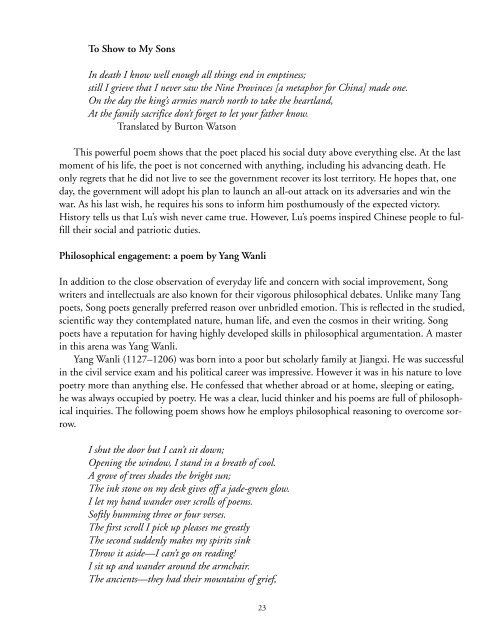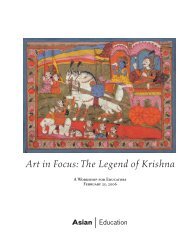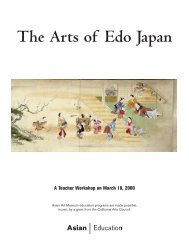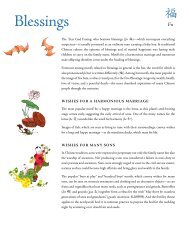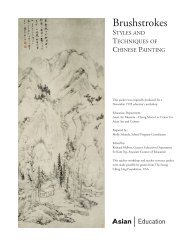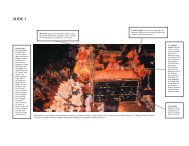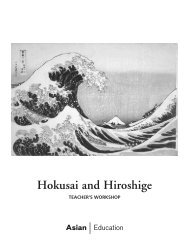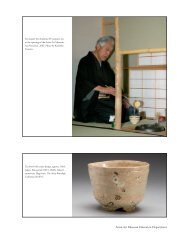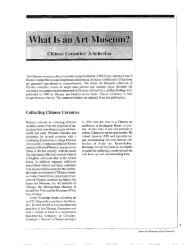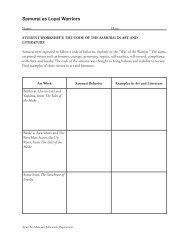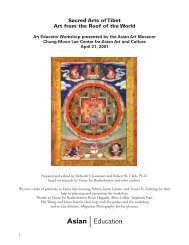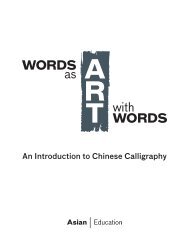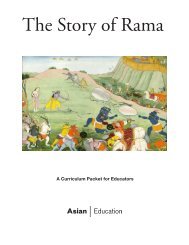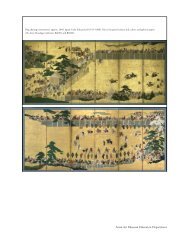China:The Glorious Tang And Song Dynasties - Asian Art Museum ...
China:The Glorious Tang And Song Dynasties - Asian Art Museum ...
China:The Glorious Tang And Song Dynasties - Asian Art Museum ...
You also want an ePaper? Increase the reach of your titles
YUMPU automatically turns print PDFs into web optimized ePapers that Google loves.
To Show to My Sons<br />
In death I know well enough all things end in emptiness;<br />
still I grieve that I never saw the Nine Provinces [a metaphor for <strong>China</strong>] made one.<br />
On the day the king’s armies march north to take the heartland,<br />
At the family sacrifice don’t forget to let your father know.<br />
Translated by Burton Watson<br />
This powerful poem shows that the poet placed his social duty above everything else. At the last<br />
moment of his life, the poet is not concerned with anything, including his advancing death. He<br />
only regrets that he did not live to see the government recover its lost territory. He hopes that, one<br />
day, the government will adopt his plan to launch an all-out attack on its adversaries and win the<br />
war. As his last wish, he requires his sons to inform him posthumously of the expected victory.<br />
History tells us that Lu’s wish never came true. However, Lu’s poems inspired Chinese people to fulfill<br />
their social and patriotic duties.<br />
Philosophical engagement: a poem by Yang Wanli<br />
In addition to the close observation of everyday life and concern with social improvement, <strong>Song</strong><br />
writers and intellectuals are also known for their vigorous philosophical debates. Unlike many <strong>Tang</strong><br />
poets, <strong>Song</strong> poets generally preferred reason over unbridled emotion. This is reflected in the studied,<br />
scientific way they contemplated nature, human life, and even the cosmos in their writing. <strong>Song</strong><br />
poets have a reputation for having highly developed skills in philosophical argumentation. A master<br />
in this arena was Yang Wanli.<br />
Yang Wanli (1127–1206) was born into a poor but scholarly family at Jiangxi. He was successful<br />
in the civil service exam and his political career was impressive. However it was in his nature to love<br />
poetry more than anything else. He confessed that whether abroad or at home, sleeping or eating,<br />
he was always occupied by poetry. He was a clear, lucid thinker and his poems are full of philosophical<br />
inquiries. <strong>The</strong> following poem shows how he employs philosophical reasoning to overcome sorrow.<br />
I shut the door but I can’t sit down;<br />
Opening the window, I stand in a breath of cool.<br />
A grove of trees shades the bright sun;<br />
<strong>The</strong> ink stone on my desk gives off a jade-green glow.<br />
I let my hand wander over scrolls of poems.<br />
Softly humming three or four verses.<br />
<strong>The</strong> first scroll I pick up pleases me greatly<br />
<strong>The</strong> second suddenly makes my spirits sink<br />
Throw it aside—I can’t go on reading!<br />
I sit up and wander around the armchair.<br />
<strong>The</strong> ancients—they had their mountains of grief,<br />
23


